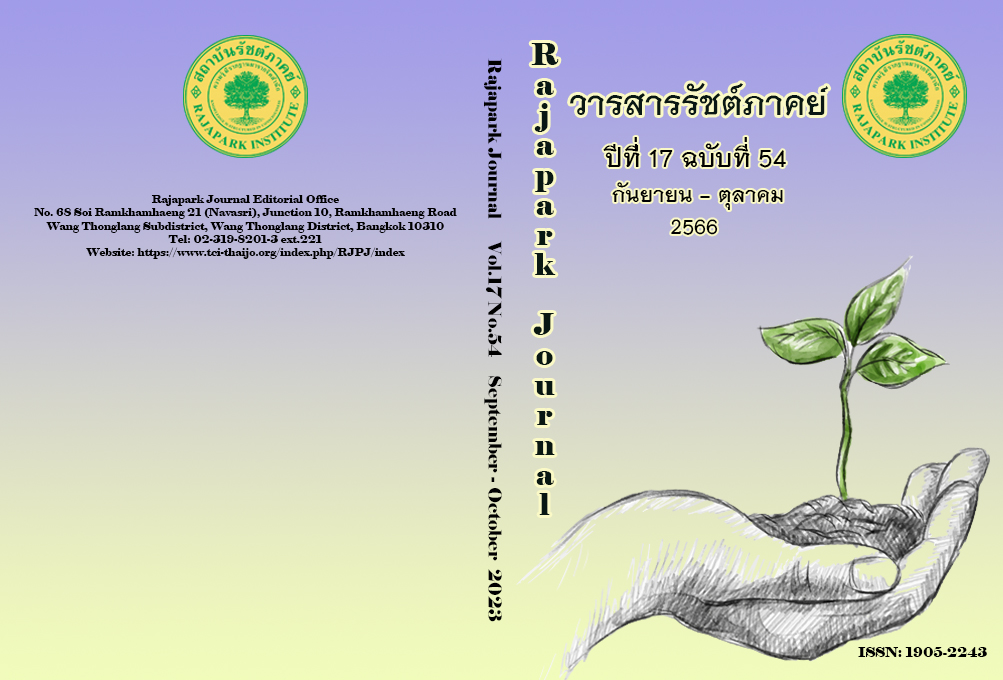Acquisition of Members of the House of Representatives of Thailand Consistent with the Majority Rule Based on the True Will of People
Main Article Content
Abstract
The academic article aimed (1) to analyze the problem of obtaining members of Thailand's House of Representatives under the provisions of the 2017 Constitution and (2) to propose acquisition guidelines for House of Representatives members in accordance with the majority rule based on the true will of the people. This article argued that democracy was the political regime that ultimately responded to people's rights and freedoms and that the principle of majority rule based on the authentic will of the people was literally important because it embodied popular sovereignty, the supreme power held by the people. It illustrated the problem of obtaining members of the House of Representatives under the provisions of the 2017 Constitution that were contrary to the majority rule principle. The acquisition guidelines for obtaining House of Representatives members proposed in this article, in accordance with the majority rule based on the true will of the people, included three characteristics: 1) consisting of two types of members, and a mixed proportional electoral system using two ballots should be implemented in order to respond to people's needs and verify the most populous party legitimated for administrative power; 2) the number of the members should be flexible in order to proportionally balance between the result in constituencies and the party’s popular votes to reflect the people’s will in the selection of the Prime Minister, the head of the administrative branch; and 3) the candidates are allowed in both constituency and political party's lists.
Article Details

This work is licensed under a Creative Commons Attribution-NonCommercial-NoDerivatives 4.0 International License.
Views and opinions appearing in the Journal it is the responsibility of the author of the article, and does not constitute the view and responsibility of the editorial team.
References
Bangkokbiznews. (2021, March 8). Reveals Election Research Results on March 24, 2019, the Problem of Mixed-member Proportional Representation System. https://www.bangkokbiznews.com/news/detail/848791.
Bundestag. (2019). Elections. https://www.bundestag.de/en/parliament/elections.
Green, S. (2012). The Politics of the New Germany. Routledge.
Homkajon, S. et al. (2005). Political and Ethical Theory (6th ed.). Ramkhamhaeng University.
Noksuansawasdee, S. (2019). Solving the 2019’s Election Calculation Formula. https://www.chula.ac.th/cuinside/19196/
Raksasat, A. (1998). The People's Constitution and Its Critique. Chulalongkorn University.
Raksasat, A. (2000). Democracy, Ideology, Principles and Government in Various Countries. Chulalongkorn University.
Sakuntaphai, P. (2013). Freedom and Social Contract. In Political Philosophy (26th ed). Sukhothai Thammathirat Open University.
Samaley S. (2006). Parliamentary Law. Ramkhamhaeng University.
Sereerangsan, T. (2013). Political and Governance System. In Fundamental Principles of Political Science (12th ed.). Sukhothai Thammathirat Open University.
Sereerangsan, T. (2014). Representative Selection System of Thai Society. King Prajadhipok's Institute.
Sirinuphong, P. (2018). Members of the House of Representatives of the Federation Republic of Germany Election Law. Law Journal, 47(2), 301-329.
Reisert, J. (2010). General Will. In Bevir, M. (ed.). Encyclopedia of Political Theory. SAGE.
Thamrongthanyawong, S. (1996). Political Attitudes of Children and Youth in Bangkok. Faculty of Public Administration, National Institute of Development Administration.
Thamrongthanyawong, S. (2001). Politics: Concepts and Development. Semadham.
The Election Commission of Thailand. (2023). 2023 Election Official Result Report. https://official.ectreport.com/overview.
The Standard (2019, May 8). 11 Small Parties Granted Seats from the Election Commission's Calculation Formula. https://thestandard.co/thailandelection2019-11-political-parties-score/.
Wisetchai, S. (2023). Thai Politics: Evolution and Changes. Napat Copy.
Wolkenstein, F. (2018). Agents of Popular Sovereignty. Political Theory, 47(3), 338-362.


